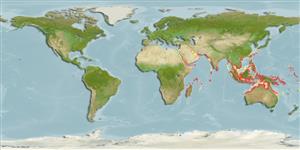Teleostei (teleosts) >
Acanthuriformes (Surgeonfishes) >
Leiognathidae (Slimys, slipmouths, or ponyfishes) > Gazzinae
Etymology: Karalla: Karalla is the local name for ponyfishes in Sri Lanka and the surrounding region where members of this genus commonly occur.
More on author: Cuvier.
Environment: milieu / climate zone / depth range / distribution range
Ecology
Marine; demersal; depth range 1 - 40 m (Ref. 3424). Tropical
Indo-West Pacific: Gulf of Aden, along the coasts of India and Sri Lanka; including Pakistan, eastwards to the Philippines (Ref. 4537); probably not reaching Australia.
Size / Weight / Age
Maturity: Lm ? range ? - ? cm
Max length : 14.0 cm TL male/unsexed; (Ref. 3424); common length : 9.0 cm TL male/unsexed; (Ref. 3424)
Found in shallow waters, predominantly over muddy bottoms (Ref. 30573). Usually occurs in schools. Feeds on polychaetes, bivalves, small crustaceans and sponges (Ref. 30573).
Life cycle and mating behavior
Maturity | Reproduction | Spawning | Eggs | Fecundity | Larvae
James, P.S.B.R., 1984. Leiognathidae. In W. Fischer and G. Bianchi (eds.) FAO species identification sheets for fishery purposes. Western Indian Ocean (Fishing Area 51). Vol. 2. FAO, Rome. pag. var. (Ref. 3424)
IUCN Red List Status (Ref. 130435: Version 2024-1)
Threat to humans
Harmless
Human uses
Fisheries: commercial
Tools
Special reports
Download XML
Internet sources
Estimates based on models
Preferred temperature (Ref.
123201): 25.3 - 29.2, mean 28.3 °C (based on 1130 cells).
Phylogenetic diversity index (Ref.
82804): PD
50 = 0.7500 [Uniqueness, from 0.5 = low to 2.0 = high].
Bayesian length-weight: a=0.02512 (0.01311 - 0.04811), b=3.00 (2.84 - 3.16), in cm total length, based on LWR estimates for this species & (Sub)family-body (Ref.
93245).
Trophic level (Ref.
69278): 3.0 ±0.36 se; based on food items.
Generation time: 0.9 ( na - na) years. Estimated as median ln(3)/K based on 2
growth studies.
Resilience (Ref.
120179): High, minimum population doubling time less than 15 months (Preliminary K or Fecundity.).
Fishing Vulnerability (Ref.
59153): Low vulnerability (11 of 100).
